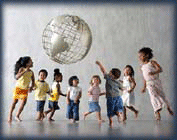The Organizing Committee welcomes submission of papers and perspectives representing a broad range of viewpoints and that highlight relevant local, national or comparative research and practice in the following thematic areas of the conference.
- Language and Universal Primary Education (MDG 2)
- Linguistic and cultural considerations in strategies that seek to achieve universal primary education
- Access and retention of children speaking non-dominant versus dominant languages in primary education
- Role of learners’ first language (L1) – or mother tongue – versus languages of wider communication (national, official or international languages) in primary education
- Multilingual education as a way towards universal primary education (UPE)
- Language in early childhood education and development: multilingual education to facilitate smooth integration into primary school
- Relationship between adult literacy in L1 and UPE
- Integration of local language and culture effectively into education policies and programs
- Language and Gender Equality (MDG 3)
- Linguistic and cultural considerations in strategies to promote gender equality and empower women
- The role of life-long learning in overcoming gender biases and discrimination, including how lifelong learning empowers both girls and boys, women and men
- Situation of women and girls in ethnolinguistic minority communities relative to their counterparts in dominant language speaking communities
- Ways that local language and culture have been effectively integrated in policies and programs to ensure equitable development opportunities, improved status and treatment of both sexes
- Language, Health, Nutrition and Protection (MDGs 4,5,6)
- Evidence and support for integrating local language and culture into policies and programs on health, nutrition and protection
- Providing equitable access to appropriate health and social welfare services for ethnolinguistic minority communities
- Utilizing language and culture to build good knowledge and practice for early childhood care and reproductive health
- Linguistic and cultural strategies to minimize the impact of communicable diseases (i.e. HIV/AIDS, TB and malaria)
- Professional social work practices across languages and cultures to prevent and respond to violence, abuse, neglect and exploitation
- Community-based mechanisms (e.g. diversion and restorative justice programs) to uphold the rights of children in ethnolinguistic minority communities
- Language and Sustainable Development (MDGs 1,7)
- Linguistic and cultural considerations in poverty reduction and environmental preservation strategies
- Situation of ethnolinguistic minorities relative to dominant language populations with regard to alleviating extreme poverty and hunger, or in mitigating environmental degradation
- Role of life-long learning in alleviating poverty and stewardship of the environment
- Role of intangible cultural heritage and indigenous knowledge in ensuring sustainable development
- Ways that local language and culture have been effectively integrated into policies and programs to facilitate equitable and sustainable development for speakers of non-dominant languages
- Drawing on language and culture to expand access to safe drinking water and improved sanitation facilities
Abstract Submissions:
Abstracts of proposed papers will be accepted until 30 July 2010. Selected presenters will be notified by 10 September 2010. We welcome submission of papers and perspectives representing a broad range of viewpoints and that highlight relevant local, national or comparative research and practice in the four thematic areas of the conference.
- Maximum of 250 words in English and should clearly identify the paper's topic and the relevance to the conference. (including the title and references)
- Track in which your paper would be presented (large headings, above): Abstract submitters should identify the track they feel is best suited to their work out of the four tracks listed in the conference announcement. The conference steering committee reserves the right to include your paper for consideration in a track other than the one you identify, if deemed appropriate.
- Single-spaced
- Justified margins
- Times New Roman 12
- Title, in bold, centered at the top of the page
- Your name, country in which you work, organizational affiliation, title
- Your e-mail address
|
Email address to submit the Abstracts to: langmdg2010@gmail.com and cc: k.bang@unesco.org
|








